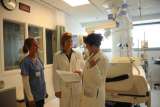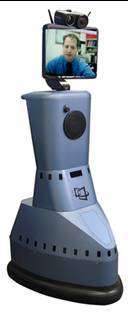Neuro ICU Family Guide
Find your care
Our neurotrauma surgeons offer advanced, lifesaving care. Call 310-825-5111 to learn more about neurotrauma and critical care services.
Introduction to the Neurointensive Care Unit

On behalf of our Neuro ICU team of dedicated healthcare professionals, we welcome you and your family to the UCLA Neurointensive Care Unit. We understand that that this is a difficult and stressful time for you and we have outlined an informational packet to assist you in this time of crisis.
Personnel
Medical Director: Paul M. Vespa, MD, FCCM, FAAN
Professor
Department of Neurosurgery and Department of Neurology
(310) 267-9448

Robert Shpiner, MD
Clinical Professor
Department of Medicine
Yince Loh MD
Assistant Professor
Departments of Neurosurgery and Radiology

Nursing Director: Barbara Anderson, RN
Nursing Educator: Shannon McCarville, RN
ICU Fellows: Catherine T. Le, Howard Fan, Mohamad Chmayssani
ICU Nurse Practitioners: Carl Wherry ACNP-bc, Elizabeth Cattell ACNP-bc, and Amanda Severson ACNP
ICU Social Worker: Darlene McGee-Reed, MSW

Organization of the Neuro ICU and Neurocritical Care Team
The Neurointensive Care Unit (Neuro ICU) is organized according to guidelines established by the Society of Critical Care Medicine. We are a referral center to many smaller hospitals because we have comprehensive specialty care for patients with brain and central nervous system critical illness. The unique setting is afforded due to the availability of physicians in training as well as senior physicians. We have applied the latest technology and treatment strategies to make the Neuro-ICU a state-of-the -art facility. UCLA is a recognized leader in the field of Neurointensive care, with the reputation built upon outstanding patient care and novel research. The Neuro-ICU is a 24 bed facility that is operated by a team of board certified physicians and nurses.
The Neuro-ICU cares for patients with all types of neurosurgical and neurological injuries, including stroke, brain hemorrhage, trauma and tumors. We work in close cooperation with your surgeon or medical doctor with whom you have had initial contact. Together with the surgeon or medical doctor, the NeuroICU attending physician and team members direct your family member's care while in the ICU. The NeuroICU team consists of the bedside nurses, nurse practitioners, physicians in specialty training (Fellows) and attending physicians. This permits comprehensive and continuous bedside care (24-7-365) that is focused on healing the patient in the ICU. The Neurointensive care attending doctor is board certified in neurocritical care. The care of your family member is coordinated with various consultants and surgeons through a series of discussions and meetings on a daily basis. Much of this coordination is done behind the scenes and may not be apparent to family members. This model of intensive care has been recognized to provide the very best level of care possible for your family member. (Angus et al, Critical Care Medicine, 2006; Varelas et al Neurocritical Care 2008).
Daily schedule in the Neuro ICU
The daily operations of the Neuro ICU (Neurological intensive care unit) at UCLA Health consists of daily rounding by doctors caring for your family member and continuous nursing care by nurses and other health care professionals. This ongoing care requires times when no visitors may be present in the Neuro ICU, or limited visitors present only. Patients also will be undergoing frequent testing that requires the patient to go to another area of the hospital. This travel occurs throughout the day and evening.
Visitation schedule in the Neuro ICU
This is the typical daily schedule for visitation.
Time of Day Visitation Policy
- 06:00 - 08:00 Hours No Visitors Permitted
- 08:00 - 12:00 1 Key Visitor Permitted - The family Spokesperson meets with the treatment team*
- 12:00-14:00 Family Visitors Permitted
- 14:00-16:00 Quiet Time - No Visitors Permitted
- 16:00-19:00 Family Visitors Permitted
- 19:00-20:00 No Visitors Permitted
- 20:00-06:00 Family Visitors Permitted
*During the doctors' daily rounds, from 08:00-12:00, we request that the family spokesperson be present in the patient room, or be available by cell phone, in order to discuss brief updates in the patient condition, obtain consents, or other urgent matters. The family spokesperson may be the durable power of attorney or next of kin. We request a single person with whom the doctors can communicate on a routine basis.
Family Meetings with the Neuro ICU treatment team
We anticipate that we will have weekly meetings with families in order to provide comprehensive overviews of the patient's condition and to provide a plan of care to the family. Discussions regarding prognosis, ethical concerns, longitudinal plan of care will be discussed. These meetings should be attended by the immediate next of kin only.
Expectations for family members in the Neuro ICU
While each patient in the Neuro ICU (Neurological Intensive Care Unit) is unique, and it is difficult to forecast the course of events for any given patient, we have found that there are expected events that are common across most if not all patients. We want to outline some principal expectations for you:
- Neurological assessment and prognosis: An assessment of the neurological condition and prognosis typically takes several days. We will make every effort to make timely, accurate, and honest evaluations and will discuss this with you.
- Communication with the care team: Information will be provided when available by members of the NeuroICU team, including the attending, fellow, resident and nurse practitioner.
- Emotional support: We expect that family members will be distraught and emotional as a result of the patient's sudden illness. We can provide social work and spiritual care for the patient and the family. We will ask the spokesperson about these needs.
- Daily care planning: We expect to develop a daily plan of care and to discuss this with the spokesperson in brief during the daily rounds.
- Weekly family meetings: We expect to develop a comprehensive care plan, including transition to the next level of care, and to discuss this at the family meeting once per week.
- Visitation expectations: Family members should expect to have only limited access for visitation, since the patients in our hospital are very sick and require high intensity care with frequent interventions and treatments.
- Teaching hospital environment: UCLA is a teaching hospital, and is comprised of senior physicians (attendings) who are in charge of the patient's care, and doctors at various levels of training, who are supervised by the attendings. This structure has more advantages than disadvantages and generally enables us to take great care of your family member. Families may feel that there a too many faces, and may feel lost. Rest assured that we will make every effort to have the attending address important issues with the spokesperson.
- Use of advanced technology: We expect to use the most advanced technology to care for your family member, including continuous brain wave monitoring, imaging tests, and robotic telepresence, to name just a few. Yet, we want to assure you that these are merely tools that enable us to provide humanistic care for your family member.
- Ethics consultations: We anticipate that we may call upon our hospital ethics service to provide consultation to family members and doctors.
- Research opportunities: UCLA is a research and development hospital, and your family member may qualify for a novel treatment or study. You may inquire about this during discussions.
Taking Care of Yourself
It is difficult to accept, but one of the best things that you can do for your family member who is in the ICU is to take good care of yourself. This includes eating regularly, sleeping in your own bed, exercise and other normal daily activities. Taking care of yourself will enable you to make better sense of the information and events that occur during the illness.
References
Angus DC, Shorr AF, White A, Dremsizov TT, Schmitz RJ, Kelley MA; Committee on Manpower for Pulmonary and Critical Care Societies (COMPACCS). Critical care delivery in the United States: distribution of services and compliance with Leapfrog recommendations. Crit Care Med. 2006 Apr;34(4):1016-24.
Varelas PN, Schultz L, Conti M, Spanaki M, Genarrelli T, Hacein-Bey L. The Impact of a Neuro-Intensivist on Patients with Stroke Admitted to a Neurosciences Intensive Care Unit. Neurocrit Care. 2008 Jan 15.
Vespa, PM. The implications of cerebral ischemia and metabolic dysfunction for treatment strategies in neurointensive care. Curr Opin Crit Care. 2006 Apr;12(2):119-23.
Vespa, P. Multimodality Monitoring and Telemonitoring in Neurocritical Care: From Microdialysis to Robotic Telepresence. Current Opinion in Critical Care. 2005 Apr;11(2):133-8.
Useful Websites: